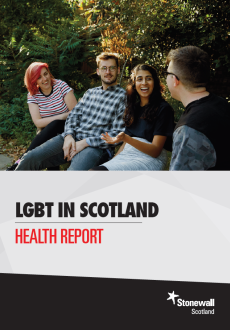LGBT in Scotland - Health (2018)
- Half of LGBT people (49 per cent) have experienced depression in the last year, including seven in ten trans people (72 per cent)
- One in four LGBT people (24 per cent) have faced discrimination in healthcare settings
- Almost two in five trans people (37 per cent) avoid seeking healthcare for fear of discrimination from staff
LGBT in Scotland – Health Report is Stonewall Scotland’s latest research, based on a YouGov polling of 1,261 LGBT people in Scotland, which highlights experiences of poor mental health, substance abuse, discrimination in healthcare environments, and challenges in accessing health services.
Key findings
- Half of LGBT people (49 per cent) have experienced depression in the last year, including seven in ten trans people (72 per cent).
- More than half of trans people (52 per cent) have thought of taking their own life in the last year.
- One in seven trans people (14 per cent) have been pressured to access services to question or change their gender identity.
- One in four LGBT people (24 per cent) have witnessed discriminatory or negative remarks against LGBT people by healthcare staff.
- Almost two in five trans people (37 per cent) have avoided healthcare treatment for fear of discrimination.
- One in four LGBT people (27 per cent) have experienced healthcare staff having a lack of understanding of specific lesbian, gay and bi health needs.
- Nearly three in five trans people (59 per cent) have experienced healthcare staff having a lack of understanding of specific trans health needs.
What respondents said
“We are still seeing terrible bullying and mental health issues in young LGBT people. A close friend's trans grandson took his life in the last two weeks. He didn't get the chance to learn that it gets better.” (Gillian, 50)
“Until very recently, I seldom had a good relationship with health centre staff, GPs and nurses. It seems to me that it never occurs to many of them to ask for or be receptive to information about gender & sexuality so that they can factor this in when dealing with healthcare needs. I suggest much better training is required in some areas. I’m 65 now and this is a concern as I think about ageing and how people are treated in hospitals and in care homes.” (Linda, 65)
“When I attended at A&E and more than one medical member of staff asked, ‘Is this your friend?’ when gesturing to my wife. How hard would it be for all staff to ask all patients ‘who have you brought with you to hospital today?’. I'm sure if my wife had been a man they wouldn't have asked if she was my friend.” (Elaine, 56)
“I have experienced repeated expression of prejudiced attitudes towards me by mental health service providers due to me being trans, some in NHS and some in non-NHS services. Repeatedly being needlessly outed as trans without my consent by NHS professionals to other NHS professionals despite being transitioned for over 15 years and having a Gender Recognition Certificate. And repeatedly being asked intrusive and completely irrelevant questions by NHS professionals about my transition and other aspects of being trans.” (Euan, 39)
